The Cheung Kong Graduate School of Business (CKGSB) hosted the 7th China Economic Symposium
The Cheung Kong Graduate School of Business (CKGSB) hosted the 7th China Economic Symposium, offering insightful perspectives on the country’s economic transformation and illuminating the real meaning behind some of the challenges and opportunities as it shifts its economy towards carbon neutrality and technology innovation. At a time of uncertainty and division, global and Chinese thought leaders and academics discussed China’s efforts to achieve common prosperity, its goal towards net zero and what its dual circulation strategy means for multinational firms.
CKGSB’s China Economic Symposium is one of our school’s flagship events, which we’ve been holding since 2015 in Beijing, London and Melbourne. The 2021 online Symposium was hosted in partnership with the Center for China and Globalization, Entrepreneurs’ Organization, Family Business Network Asia, as well as the American, British, Australian, Canadian and Swiss Chambers of Commerce in China. We are also grateful to our Strategic Media Partners who promoted and live-streamed this Symposium; they included Chosun Ilbo’s Asian Leadership Conference, ETnews, Caijing, Baidu, Sohu and 36Kr.
The symposium started with an opening address by CKGSB’s Founding Dean and Professor of China Business and Globalization Dr Xiang Bing, on his observations and understanding of China’s recent common prosperity goals. “It is difficult for businesses, governments, multilateral institutions, non-profit organizations or civil society alone to address humanity’s most pressing societal issues – like income and wealth inequality, social immobility and sustainability,” said Dean Xiang. He went on to say, “These issues can only be solved through social innovation—the collaboration among all entities to develop and deploy effective and innovative solutions. Looking ahead, I believe social innovation will play a more important role in achieving the common prosperity. In a time of global disruptions, companies, in particular, will have to reconsider their social positioning and responsibilities, embrace social innovation in their business operations and play an active role in advancing social innovation in the future.”
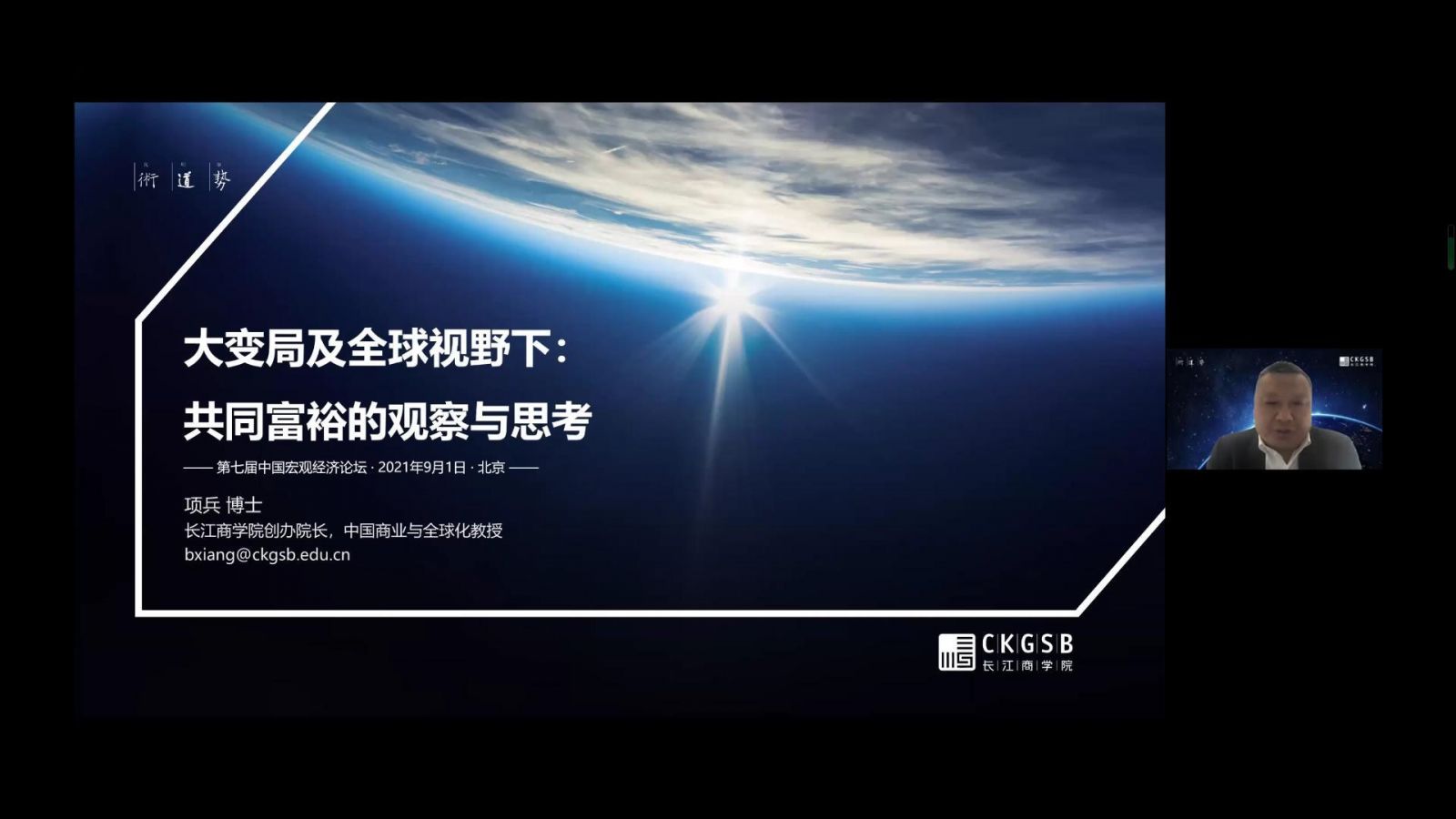
Next, Dr. Henry Wang, Founder and President of the Center for China and Globalization, a leading Chinese think tank, spoke about the promising future for China’s global collaborations and China’s contribution to economic globalization. According to Dr. Wang, “China has made six contributions to the world: its reform and opening up promoted economic development, which has in turn promoted the development of the whole world; the development of China’s manufacturing has created a global value chain; China’s Belt and Road Initiative; and China’s contributions towards peace and development, committing to the goals of the United Nations.” Dr. Wang emphasized that China will contribute more in the future in “global governance, on issues such as climate change.”
Celebrating the tenth anniversary of his widely followed index—the CKGSB Business Conditions Index—which gauges Chinese executives’ sentiment on China’s macroeconomic environment, Professor Li, CKGSB Associate Dean and Professor of Economics, offered his insights on the Chinese economy’s development and prospects based on 10 years of data he has collected. “In 2017, the Chinese Central Bank launched regulatory actions to rectify shadow banking. Because the actions were quite effective, many firms faced a liquidity crisis in 2018. The PBOC and the China Banking Regulatory Commission began to take rectification measures into full play. This caused a problem for private businesses in China partly because most small and medium sized companies use short-term money to support their long-term investment. That caused a significant shock to the businesses we surveyed. Luckily the government acted quickly to revive the economy.” Professor Li then explained the reasons for what fueled the shadow banking industry in the first place, going on to say, “Most of the volatility is related to policy changes, particularly macro and financial policy changes,” said Professor Li.
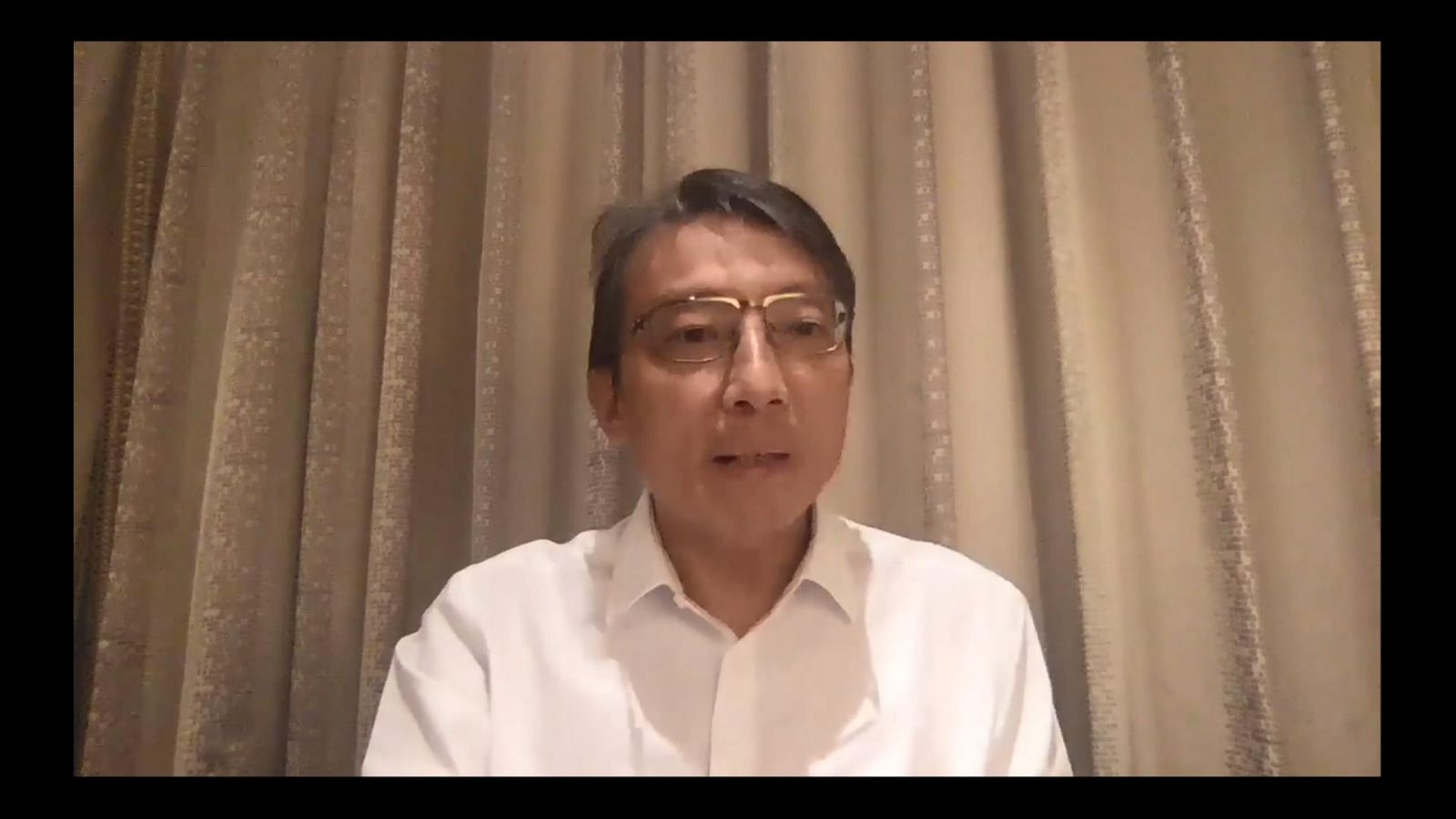
Next, Dr. Wei Jianing, the Former Deputy Director-General and Inspector at the Department of Macroeconomic Research in the Development Research Center of the State Council (DRC), illustrated the current economic climate, in which he highlighted the role, opportunities and challenges of private enterprises. “China is facing more economic downward pressure,” said Dr. Wei. “Drivers that have contributed to China’s economic growth include demographic dividend such as labor, China’s high saving rate and technology. In the next decades, the demographic dividend is going away and the savings rate is decreasing, too. Copycat technology is restricted by IP protection and technology from overseas is now limited by the US-China trade war. In the future, without innovation, there will be no economic growth. The private sector has become the major source for innovation. In fact, the private sector in China is China’s only hope to driving economic growth.”
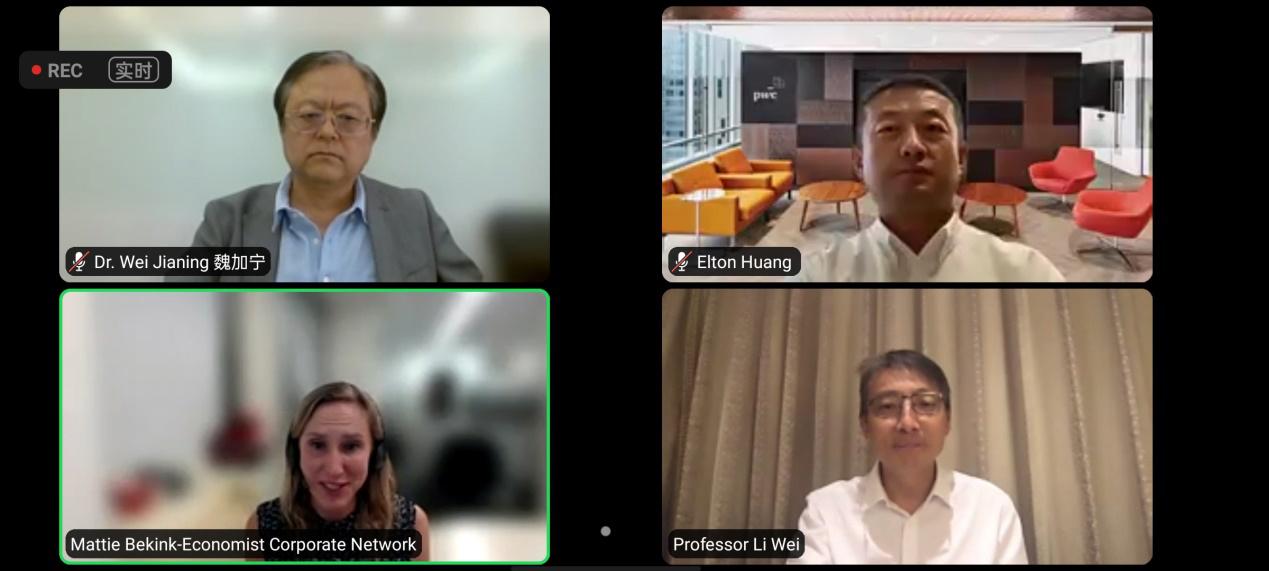
Following Dr. Wei’s presentation, Mattie Bekink, the China Director of the Economist Corporate Network, moderated the Foreign Investment and Domestic Demand under China’s Dual Circulation Strategy panel with Professor Li Wei, Dr Wei Jianing and Elton Huang, Partner at PwC.
Bekink asked Professor Li, “How are private companies shifting their businesses and what are the current systemic risks?” Professor Li replied, “The limitation of policy and the direction of policy are not as clear as before. Private companies are still figuring out what they should do. I think having more policy clarity would help.”
Subsequently, Huang spoke on how foreign companies can be a part of the dual circulation strategy. “I think the key question is the interpretation of dual circulation. From the foreign perspective, I heard one interpretation of dual circulation as local products to local demand, which means there’s no incentive for foreign products. But if you look at the multinationals in China, they have very different interpretations. They believe it’s not about restrictions, it’s about the supply chain reform by providing high-quality talent, so as to unleash the full potential of the market,” says Huang. He goes on to suggest that, “Foreign investments need to understand the dynamics of the market and understand how China is regulated. If you look at the recent regulations, you will see a lack of coordination on the regulatory bodies. And some of those regulatory bodies may not have sufficient assessment of the impact of the market. But such phenomena happen around the world, not just China. I think people need to understand them, so they can build those risk factors into their return-on-investment analysis and market-entry analysis.”
After the first panel discussion, Professor of Accounting and Finance and Associate Dean Liu Jing shared his view on carbon neutrality and the renewable energy revolution. He talked about the current climate situation and reasons why countries must become carbon neutral. But he also highlighted the obstacles that are stopping countries from cutting down on carbon voluntarily. “China on a per-capita basis only uses a quarter of the energy as someone in the US.” Dr. Liu then went on to explain some current solutions already being implemented by countries to cut down on carbon emission. “The most efficient way is to cap the total emission of carbon by country, locality or company and let players trade on the price of carbon, allowing the market to take over.”
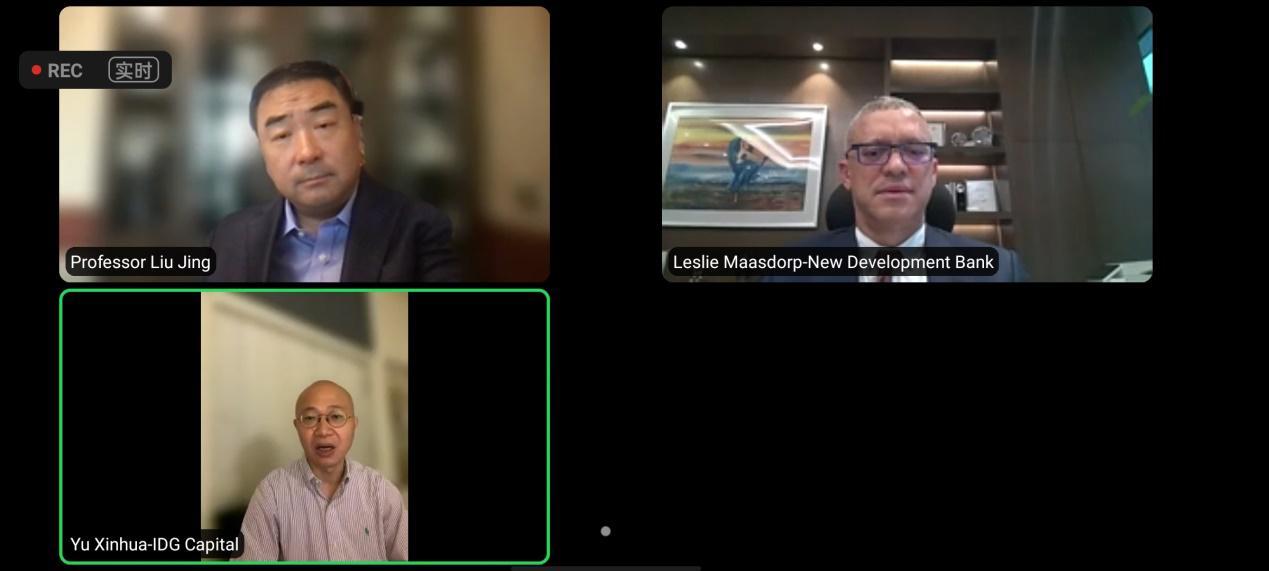
After his presentation, Dr. Liu launched straight into the second panel discussion, where speakers elaborated on the trends in China’s carbon neutrality and clean energy investment sector. Leslie Maasdorp, the Vice President and Chief Financial Officer of the New Development Bank started the conversation by saying he felt optimistic on China’s carbon neutrality goals, stating that they were “realistic” and “achievable.” “Because of the 28% total emission contribution China makes towards global emission, it has a very special and factorial role to play in achieving net zero. The multilateral banks and financial sector in general have a very critical role to play in providing the finance to enable that. Our starting point is that net zero presents new opportunities for businesses. The approach many global corporations are taking today is that sustainability and the drive to net zero can be a source for competitive advantage.”
Yu Xinhua, Partner at IDG Capital and CKGSB alumnus, discussed the driving force for carbon neutrality in Chinese companies. Yu also talked about technology companies where IDG has focused their latest investments. “Clean tech will be the direction for human development and provide the solutions for human crises.”
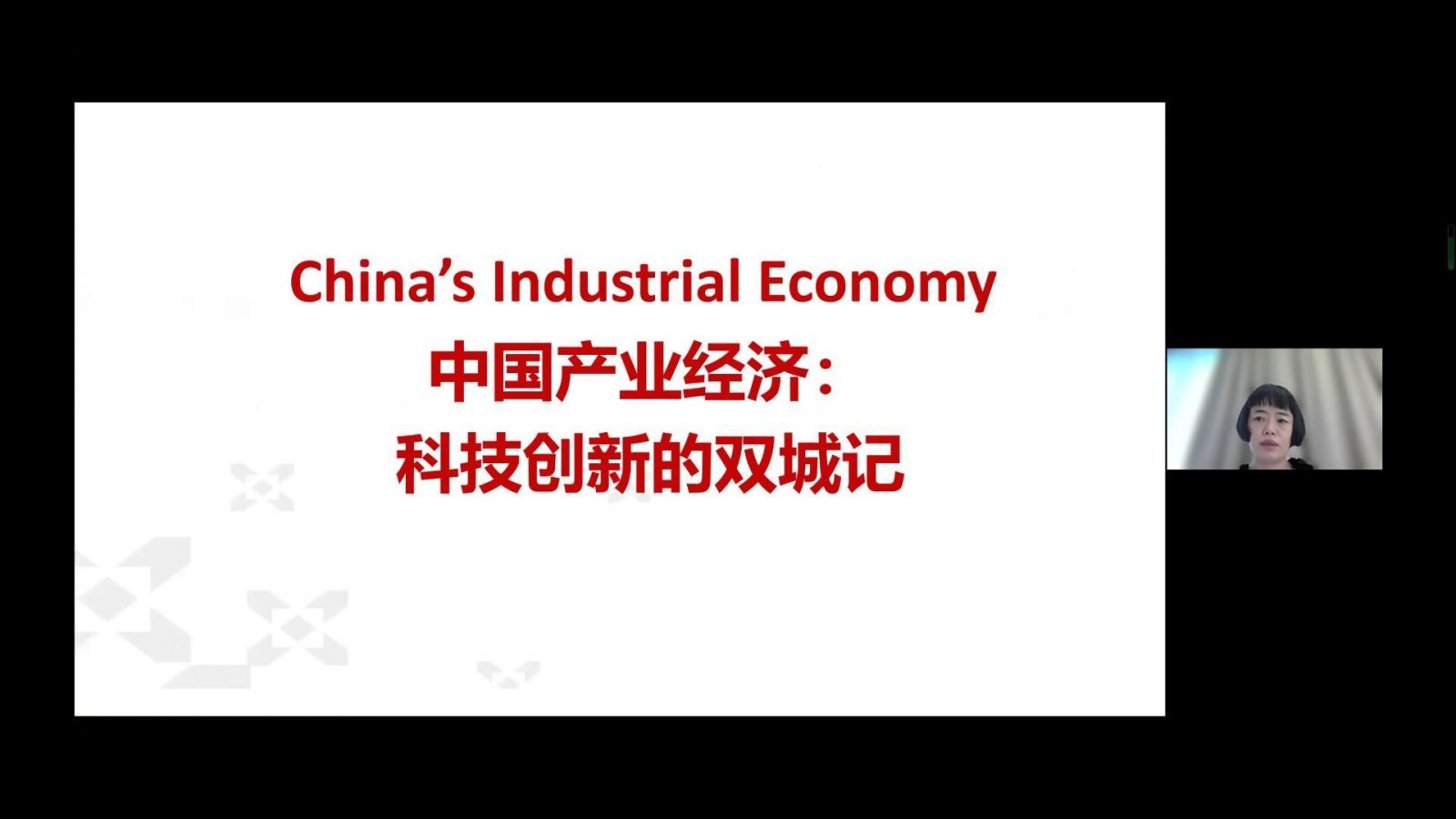
Finally, Dr. Gan Jie, Professor of Finance, Academic Director for MBA Programs and Director of the Center on Finance and Economic Growth at CKGSB, ended the symposium with a presentation on the trends and analysis of China’s industrial economy. Professor Gan explained some of the key findings of her large-scale industrial sector survey and some of the myths about China’s technology sector. She also took the opportunity to highlight some new technology that Chinese companies have developed, highlighting that future of China’s tech company is bright, despite ongoing overcapacity in the sector.
At the Symposium, CKGSB also launched its report “China’s Economy: Its Past, Present and Future” that features eight Chinese and global experts who weigh in on the key trends and changes in China’s economic development, the implications for international companies, as well as the challenges and opportunities its future holds. Click here to read the report. https://english.ckgsb.edu.cn/blog/report-chinas-economy-its-past-present-and-future/
7th China Economic Symposium (Original in Mandarin and English)
7th China Economic Symposium (English translation)
About the China Economic Symposium
The CKGSB China Economic Symposium convenes global thought leaders to deliver insights, generate ideas and make the connections needed to create an economically sustainable future in China and around the world. This flagship event has been held around the world from Beijing to London and Melbourne since 2015.
About Cheung Kong Graduate School of Business (CKGSB)
Established in Beijing in November 2002 with support from the Li Ka Shing Foundation, CKGSB is China’s first privately-funded and research-driven business school. Located across China in Beijing, Shanghai and Shenzhen with global offices in New York, London and Hong Kong, the school offers innovative MBA, Executive MBA, Business Scholars Program and Executive Education programs. For more information, please visit https://english.ckgsb.edu.cn/.